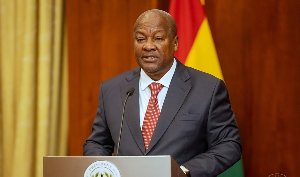The 2006 Social Watch Report has disclosed that Ghana government's revenue position has been harmed by a number of corporate tax concessions that are supposed to help spur economic activity in the country.
The report said this has had no such effect and because these companies are foreign owned a higher percentage of the tax breaks are repatriated back home as profits.
The Ghana Paper in the report was submitted by the Network for Women's Rights (NETRIGHT) which is made up of women' rights activists, women's organizations and civil society groups and was launched in Accra last Tuesday.
For instance, through its website, Ghana's Embassy in Switzerland is promising prospective investors in Ghana golden opportunities in agriculture, mining, real estate etc.
Other incentives are as follows: warm and friendly people, cheap labour, Investment safety, Investment laws that guarantee 100 percent transfer of profit, Multilateral Investment Guarantee Agency (MIGA) of the World Bank's guarantee, corporate tax of 8 percent on non-traditional exports income, 25 percent for hotels and 32.5 percent for others.
Also tax holidays are indefinite for cocoa farming; 3-10 years depending on sector; 10 years for free zones with eight percent corporate tax thereafter, tariff exemption, 100 percent, 100 percent duty exemption for production equipment as well as carry forward losses for all companies except mining and insurance. While insurance companies can carry forward losses indefinitely, mining companies are allowed to carry forward losses but restricted to only capital allowances granted for the year.
Information available at the US Diplomatic Mission though Ghana's Website also indicates that there are no requirements on physical location of investments. However, there are tax incentives to encourage investment in specific locations. There are also no import substitution restrictions, but there is an export quota of seventy percent for companies operating under the Free Zone Act. The only requirement for compulsory employment of Ghanaians is that any investment in a trading enterprise must employ a minimum of ten Ghanaians.
Weak taxation and internally inconsistent administrations means that several potential corporate or individual tax payers many of them among the richest in the country remain outside the tax net despite several pledges by the government to plug the loopholes, the report said.
The report said Ghana needs to raise its own revenue since donor aid cannot be constantly relied on hence; the need to collect more revenue from Trans National Corporations.
The report said the 2003 budget attested to the fact that delays and shortfalls in donor inflows have often forced government to cut back on development expenditure. That budget therefore aimed among others at reducing the reliance on net domestic financing and minimising the dependence on donor inflows.
"Our firm belief is that a government that mobilises its revenue through a well-developed domestic tax system and manages its expenditures efficiently is able to respond to the needs of its citizens even in the face of adverse external shock," the report further quotes the 2003 budget statement, adding, "this pledge was followed by 123 policy initiatives aimed at increasing domestic revenue for development.
This it says must have also contributed to the sharp growth in real payroll taxes from 19.4 to 30.4 percent with corporate taxes growing in real terms by 10.9 as against the 4.7 figure recorded in 2002.
Under the reforms, tax colleting agencies were reinforced in terms of recruitment, training, compensation and equipment and other facilities.
The report was of the view that no attempt was made to simplify tax payment procedures.
"The long distance often involved in getting to tax offices and the cumbersome procedures are all factors that discourage compliance and lead to lower tax intake," the report said.
The Regional Programme Manager for Abantu for Development and Convener for NETRIGHT Dr. Rose Mensah Kutin said that the erratic and fragmented nature of foreign aid in Ghana has not made development planning and management only difficult but also distorts the policy priorities of government.
Mensah Kutin said the multiplicity of donor-country assistance frameworks -such as the World Bank's Poverty Reduction Strategy papers, the US government's Millennium Challenge Account and the African Growth and Opportunities Act as well as the United Kingdom's Commission for Africa creates the conditions for poor countries like Ghana eager for financial resources to produce development plans that are not helpful.
Kutin Mensah said many such plans have tended to ignore the gender dimensions of poverty or have attempted to pay lip service to addressing them after pressure from women's groups.
The report on Ghana says disbursed foreign grants between 1999 and 2005 consistently fell below the forecasts in every year, except in the 2004 when Ghana reached the Completion Point of the Highly Indebted Poor Countries Initiative (HIPC).
According to the report the shortfalls however occurred against a background of generally rising levels of external grants. When adjusted for inflation, these grants rose to 303 billion cedis in 1999, consisting of 117 million dollars to 1,708 trillion which is 186.7 billion US dollars in 2005 with a cumulative increase of 464 percent.
Again over the same period, the domestic share of capital expenditures fell from 48 percent to 20 percent having reached a low of 12 percent in 2001, the same year that Ghana adopted the HIPC initiative.
Also in 2001, the government put a freeze on spending and this according to the report was part of a larger strategy to restore macroeconomic stability.
In spite of these, the report says the restoration of macroeconomic stability has not been matched with a corresponding rise with domestic share of capital expenditures. Therefore while foreign aid in terms of grants has increased significantly, it has been erratic and largely fallen short of expectations.
Business News of Tuesday, 7 November 2006
Source: Public Agenda












